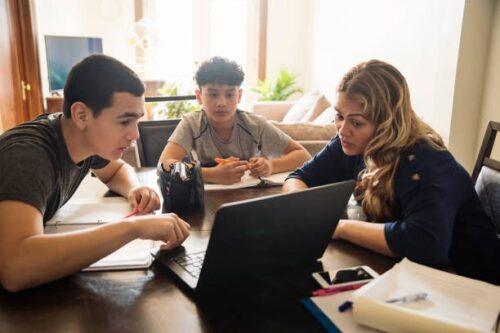The most common question you will likely be asked (or ask yourself), regardless of how long you have been practicing homeschooling, is regarding interacting with others. When education takes place at home instead of in a classroom, how will your children get connected appropriately with others? How beneficial is homeschooling for academic, emotional, and mental growth? And what positive effects does education have on the bond between parents and kids? To answer these, you must first of all, you need to understand the basics of homeschooling.

What Is Homeschooling?
The practice of not sending your children to a regular public or private school and educating them at home –is called homeschooling. But there is more to homeschooling than just giving your kids a home education. As a homeschool mom, you are in charge of scheduling routine dental and medical appointments and health screenings, keeping an eye out for any physical or mental health issues, monitoring your kids for learning difficulties, and teaching them about good health. As the sole guidance for your kids’ mental health, you will need to take on the job of school counselor while teaching them academic lessons.
Note that a greater risk and decision accompany homeschooling. When you no longer allow them to go to school, the kids will not receive the health and wellness services offered by public schools in your area if you choose to homeschool. Therefore, it will be up to you to make sure your child receives these services.
Be advised that some homeschool moms may come to identify with the method and take offense at any criticism or worry, especially other working homeschool moms. Furthermore, many parents who homeschool are used to being mocked or chastised for their decision, which may render parents defensive. This is regrettable since it may make it more challenging to reflect on the caliber of the instruction parents are offering to their kids, specially those working homeschool moms. In this process, this is a concept that should guide the approach to a friend or member of your family.
Take note that for homeschooling learners, this is a particularly important period for academic development. A homeschooled child may find it challenging to get into college or even find employment that doesn’t require a degree of college students if they graduate from high school with few academic achievements and only occasional coverage of fundamental subjects. If you are worried about a child learning in an unconventional manner or not in school, first educate yourself about the positives and downsides of homeschooling. Additionally, homeschooled children could or might not successfully adopt the new teaching methodology.
How To Help And Start Caring For Homeschooled Children
Show Interest
Homeschooled Children tend to have stronger connections with their parents, family members, and other adults in the house. Thus, show interest in the children’s education and areas of curiosity in learning. Please inquire about the educational activities your friend or relative is involved in homeschooling and express your interest in learning more about their homeschooling method. Please pay attention to what they have to say and take note of their suggestions before engaging in homeschooling your kids. Ask them questions or offer suggestions for further topics or areas they should discuss. Understand that compared to children who receive schooling conventionally, homeschooled different ages are more likely to be ethical and take on social responsibilities since they are receptive and enjoy trying new things.

Offer Tutoring
Any seasoned parent (mostly working moms who work independently for hours) who has homeschooled their children will agree that every kid’s learning experiences and needs usually vary. There are certain things that your kids may need that other homeschooled children don’t. Therefore, offer to tutor the kids on subjects you are knowledgeable about or are passionate about. Children should be supported in developing their interests and skills. Inform your friend or relative that you value their children’s education and that, if you are able, you would like to assist with the homeschooling process. From time to time, consider passing on various educational and learning materials to someone you know who is homeschooling their children.
Find Local Enrichment Activities
Find out what interests the kids and investigate the availability of community resources in these areas, such as reading organizations, historical communities, robotics and technology clubs, theatre groups, and wildlife centers. Provide your friend or family member with details regarding associations, classes, or activities, and if you live nearby, offer to watch the kids on these kinds of occasions. Additionally, you and your homeschoolers can volunteer at a soup kitchen, homeless shelter, or local zoo. Older children may participate at a nearby hospital, pet rescue, or other non-profit organizations. There are many chances to introduce homeschooled children to local civic associations.
Find Local Tutoring Resourceshil
See whether a literacy partnership exists in your friend’s or family member’s neighborhood. These groups usually provide free reading lessons for adults and children. The children’s librarians at your neighborhood library can also direct you to other tutoring options available in the community, such as after-school programs that the homeschooled kids may be able to attend. Usually, these are events frequently hosted at community centers or churches. Give a friend or member of your family this information. First, spend some time getting acquainted with the topics that most education programs cover. Decide on a plan for talking to the kids about these subjects.
Suggest Involvement In The Public Schools
Homeschooled children may participate in extracurricular or curriculum activities at the public school in their community in certain places. Inform your friend or family member that the children may be able to take musical, art, or even math or science for free at their neighborhood public schools by giving the district’s educational organization a call to learn more about their policies and programs. This is an excellent method to improve your child’s education, help them become more self-reliant, and provide them with socialization chances even if they are homeschooled.
Get Involved In Sports
Together with opportunities for meaningful social interaction, there are educational programs available. If the kids enjoy sports, enrolling them in a local team (or, if permitted, through the neighborhood school district) is a great method to help them interact with other people. Many of the critical life skills that you want your homeschooled kids to acquire, like communication, teamwork, and emotional regulation, are incorporated into sports. If this isn’t possible, look for sports possibilities via private learning institutions, homeschool cooperatives, or community leagues. Some other homeschool families join a neighborhood swim team, while others are getting a family YMCA membership.
Mention Possible Special Needs
Inform a family member or close friend that you’re worried about a homeschooled child’s potential for learning difficulties or other special needs, and find out if they’d be willing to get the child evaluated. Inform them that parents may get a free, no-obligation assessment for the child’s learning problems at the public school in their area. Even if you may be most acquainted with the concept of teaching characteristics or mindfulness to homeschooled students, it is crucial to ensure that educational learning is secure and that younger ones with special needs receive lessons that are specifically designed for them. Always focus on the child care options and ideas that are suitable for kids of all ages.

Promote Extracurriculars
Children who are homeschooled should participate in a wide range of extracurricular activities. As you explore the children’s activities, recommend to your friend or relative that kids should participate in Girl Scouts or other local groups. If you live close, offer to drive the kids to these extracurricular programs. Get your homeschooler outdoors, no matter what you do. Homeschooled children naturally require sunlight and exercise, just like any other child. The children will have more socialization possibilities if you take them outside of home and away from their comfort zones.
Speak The Language
Rather than coming across as judgmental of your friend or relative, make sure to project a sense of desire to support them. Tell them how much you appreciate what they are doing with all their efforts in homeschooling the kids. Make it clear to them that after-school activities or literacy tutoring would relieve some of the load and provide them with a break to run a few errands or prepare dinner. A healthy dose of emotion control is something you want to encourage other parents like you, and you want to support the homeschooled children’s achievement as well. Making friends and developing perseverance and independence are two excellent benefits of doing this.
Let The Children Know You Care
Take an interest in the kids during childcare. Take them out for an ice cream treat, read aloud to them, and be the admirable and motivating “cool” parent, relative or family friend. Tell them you appreciate and care for them. Don’t try to put them at odds or make them feel horrible about falling behind in their studies just because they are homeschooled children. Remind them of your confidence in them and support the kids in their academic pursuits. Teach them to get organized, talk to them about your concerns, and provide s better example or a great option for proper group behavior.
Final Thoughts And Takeaways
One benefit of homeschooling is the ability for learners to advance concerning their individual personality types and schedules. However, being homeschooled does not mean the child will never socialize or acquire the skills they need to succeed later. Playdates, community-based workshops, and get-togethers are some inventive ways to keep them socialized. Knowing that homeschooling a child won’t benefit anyone’s general social development. Besides, there are plenty of ways to ensure home-schooled children succeed and make important relationships with others. All it takes is an acceptance and understanding of the type of educational learning approach, even without money involved. You can always hope for the best.
Frequently Asked Questions (FAQs)
What Kind Of Children Benefit From Homeschooling?
Are homeschooling programs as efficient as they should be?
What is the biggest disadvantage of homeschooling?
Is online or home school an effective way to learn?
What are the benefits your child can get from education?
What are the benefits of school-based parental involvement in children’s learning?
What are the advantages and disadvantages of traditional learning?
Which is better, learning at home or at school?
What is the difference between homeschooling and home-based learning?
Is online education better than traditional education?
Is virtual schooling as good as in-person classes?
Which is more effective, blended or traditional learning?
Why do students prefer traditional learning?
Why do traditional face-to-face classrooms promote a better learning environment?
What is blended learning and its advantages?
